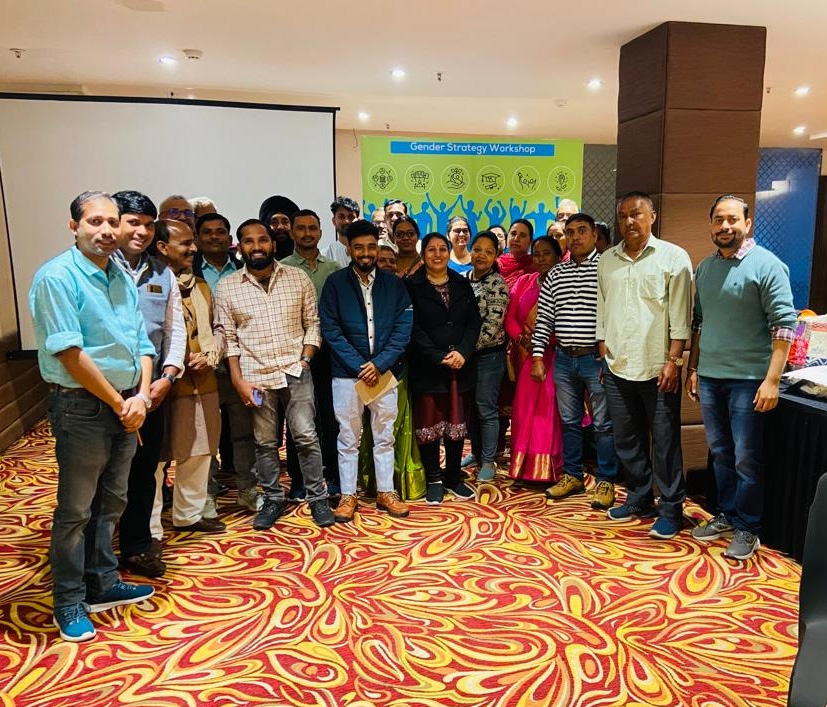In the contemporary landscape, the focus on gender strategy emerged a pivotal force for collaboration and synergy within every organization. Making empowerment more than just a promise; Fairtrade actively addresses multifaceted gender disparities in every step. Conducted bilingually in Hindi and English, the gender strategy program was organizations by Fairtrade NAPP with a commitment to meeting participants’ diverse needs. This program equipped 31 leaders from various producer organizations with knowledge to address gender inequality and empower women within the context of producer organization in Northern India.

The first day of the program focused on enhancing the participant’s understanding of gender concepts and debunking misconceptions prevalent among farmers. It started with an introductory session by introducing the participants, the objectives, session plan and the ground rules. The next session focused on social construction of gender through a session on sociogramming or gender check list. This featured an insightful exploration of social, political, economic, and cultural inequities prevalent in our society. This helped the participants to understand and address these gender-based disparities from a holistic perspective. The next session clarified very crucial concepts about gender and discrimination while focusing on moving towards equity to equality in next session.
“We laughed, we cried, and we bonded around our individual experiences of deep wounding and personal shame — sharing the beginnings of our journey towards reconciliation between our genders. My heart is still resonating with joy and a growing sense of hope that gender equity might actually become a reality during our ‘generation’ lives.” – Dr. Anuj Kumar (Development Officer), Nature Pearls Private Limited, Group of Small Organic Farmers Nanpara, India.
 The second day of the workshop explored into the ‘engendering’ of various aspect such as production, reproduction, paid and unpaid work, along with access and control of resources. The day involved hands-on group activities, focusing on creating matrices and analyzing the topics through a gender perspective. A SWOT analysis (Strengths, Weaknesses, Opportunities, and Threats) was then conducted to assess the current gender-related situation and identify areas for improvement within the producer organizations. Each group shared their insights and experiences from their organization. With guidance, an action plan was formulated in collaboration with steps to be taken over the course of a year to implement the gender strategy effectively. The participants actively engaged in discussions and presentations to identify and decide on the issues they want to raise in their respective organizations for the year 2024.
The second day of the workshop explored into the ‘engendering’ of various aspect such as production, reproduction, paid and unpaid work, along with access and control of resources. The day involved hands-on group activities, focusing on creating matrices and analyzing the topics through a gender perspective. A SWOT analysis (Strengths, Weaknesses, Opportunities, and Threats) was then conducted to assess the current gender-related situation and identify areas for improvement within the producer organizations. Each group shared their insights and experiences from their organization. With guidance, an action plan was formulated in collaboration with steps to be taken over the course of a year to implement the gender strategy effectively. The participants actively engaged in discussions and presentations to identify and decide on the issues they want to raise in their respective organizations for the year 2024.
“Attending a workshop on the topic of ‘gender,’ where we’re sharing the beginnings of our journey towards reconciliation between genders. This workshop has provided valuable insights into gender-related matters, enhancing my self-confidence and leadership qualities. I believe that gender equality is crucial for all organizations.” – Chhaya Thakur, President, Himalayan Wetland Basmati Growers Group, India.
The action planning activity provided a platform for the participants to actively engage in shaping the future agenda of their organization and the producer network at large. By collectively identifying and selecting the most pressing issues, the participants demonstrated a commitment to addressing gender-related challenges and seizing opportunities within the agricultural landscape. The development of action plans ensured a systematic approach to drive meaningful change and foster sustainable development in the producer organizations with a central focus on the gender aspects. The participants developed gender strategy for 2024 with the following focus –
· Increasing female participation in all activities. This includes participation in decision making, leadership positions, and economic activities.
· Providing critical health services to women. This includes access to reproductive health care, maternal health care, and sexual health care.
· Facilitating income generation activities for women. This includes training and supporting for women to start their own businesses or to find employment.
· Promoting government linkages by working with government agencies to ensure that women’s needs are taken into account in policies and programs.
· Facilitating gender training for all staff and volunteers. This training will help to raise awareness of gender issues and to ensure that all programs are gender-sensitive. Action Plan prepared by during group
· Developing gender-sensitive policies and procedures. This will ensure that women’s needs are taken into account in all aspects of the organization’s work.
· Providing financial support for women’s projects. This support can help women to start their own businesses or to improve their existing businesses.
· Advocating for women’s rights. This includes working with government agencies and other organizations to promote women’s rights and to ensure that women have equal opportunities.
By addressing these objectives, the workshop initiated positive change and foster gender equality within the Farmer Producer Organization and the wider community. By adopting strategic measures and collaborating with relevant stakeholders, the producer organizations can empower farmers, enhance their incomes, and contribute to gender-inclusive agricultural development.
“Some good information about gender discrimination has come to light. This will help us in eliminating prevalent discrimination within our community.” – Manita Singh, Organic India Farmers Producers Company Limited.





